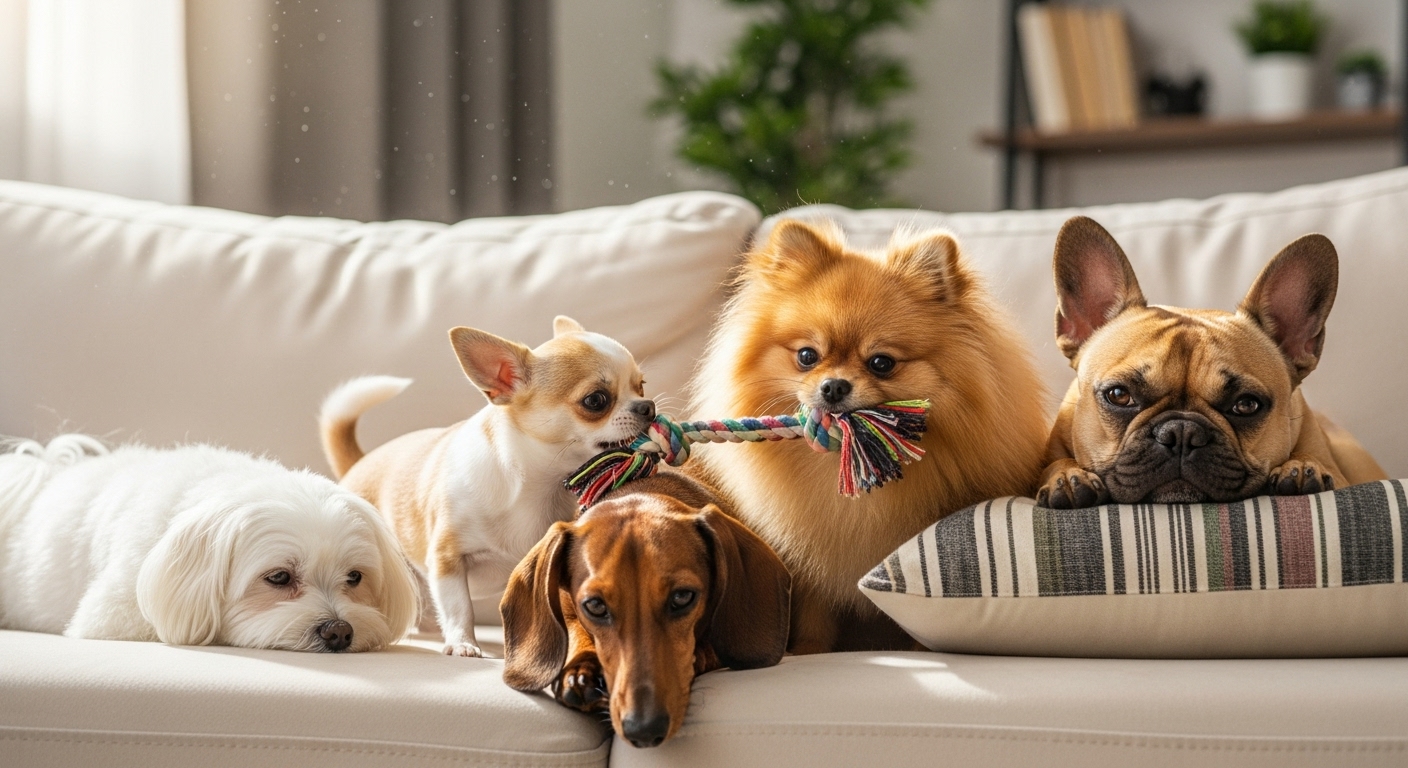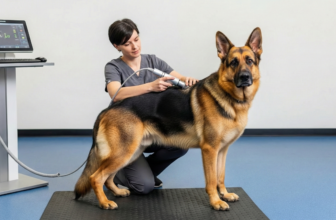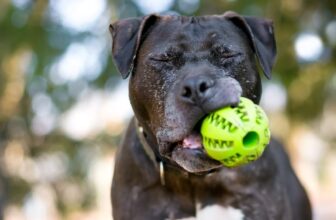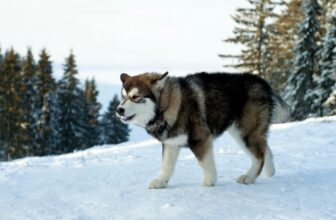
Check out our latest products
Small dogs have a way of stealing hearts with their charm, intelligence, and big personalities. Despite their petite size, many of these dogs pack an impressive amount of energy and confidence. From lap-loving companions to spunky adventurers, small breeds come in a wide variety of shapes, coats, and temperaments.
Whether you’re considering adopting a toy-sized pup or simply want to understand them better, this guide covers everything you need to know about small dog breeds — from their behavior and care to popular examples and training tips.
Characteristics of Small Dog Breeds
Size and Weight
While there’s no single definition, most small dog breeds weigh under 25 pounds and stand less than 16 inches tall. Within this category, you’ll find several subgroups:
-
Toy breeds: Usually under 10 pounds (e.g., Chihuahua, Maltese, Toy Poodle)
-
Miniature breeds: Between 10–20 pounds (e.g., Miniature Schnauzer, Boston Terrier)
-
Small companions: Between 20–25 pounds (e.g., French Bulldog, Cocker Spaniel)
Their manageable size makes them ideal for apartment living, travel, and households where space is limited.
Personality and Temperament
Small dogs are often described as lively, alert, and affectionate. Many have strong bonds with their families and enjoy being close to their people. However, they can also be surprisingly bold — often unaware of their small stature.
Common personality traits include:
-
Courageous: Many small breeds were originally bred for hunting vermin or guarding property.
-
Intelligent: Quick learners that excel in obedience and agility when trained with patience.
-
Loyal: They form strong emotional attachments and can be protective of their families.
-
Playful: Love interactive games and thrive on attention.
Lifespan
Smaller dogs generally live longer than larger breeds, often reaching 12–16 years or more with proper care. Their longevity is one reason many families choose them as lifelong companions.
Popular Small Dog Breeds
Here are ten beloved small dog breeds — each with a unique personality and care profile.
1. Chihuahua
Weight: 2–6 pounds
Temperament: Alert, devoted, sassy
The Chihuahua is one of the smallest dog breeds but has one of the biggest personalities. Loyal and confident, they make excellent companions but require early socialization to prevent excessive barking or timidity.
2. Pomeranian
Weight: 3–7 pounds
Temperament: Playful, outgoing, intelligent
Known for their fluffy coats and fox-like faces, Pomeranians are energetic extroverts. They thrive on attention and are happiest when included in daily family life. Regular grooming keeps their dense double coat looking its best.
3. Maltese
Weight: 4–7 pounds
Temperament: Gentle, affectionate, playful
The Maltese has a silky white coat and a sweet, friendly nature. They love companionship and do well in smaller homes. Their long coat needs frequent brushing to prevent tangles.
4. Yorkshire Terrier
Weight: 5–8 pounds
Temperament: Bold, loving, lively
Yorkies are spirited little dogs with a luxurious, silky coat. They’re loyal companions that adapt well to indoor living but still enjoy brisk walks and play sessions. Their confidence and curiosity make them fun but occasionally stubborn.
5. French Bulldog
Weight: 16–28 pounds
Temperament: Calm, affectionate, social
The French Bulldog is a compact, muscular breed known for its bat-like ears and affectionate nature. They’re low-maintenance in grooming but need protection from heat and overexertion due to their short muzzles.
6. Miniature Schnauzer
Weight: 11–20 pounds
Temperament: Alert, loyal, intelligent
With their signature beard and eyebrows, Miniature Schnauzers are intelligent, friendly dogs with a strong protective streak. They’re great with families and easy to train but benefit from consistent leadership and regular exercise.
7. Cavalier King Charles Spaniel
Weight: 13–18 pounds
Temperament: Gentle, affectionate, adaptable
This graceful breed combines toy size with a sporting heritage. Cavaliers are affectionate and friendly, making them excellent with children and other pets. Their long, silky coat requires moderate grooming.
8. Boston Terrier
Weight: 12–25 pounds
Temperament: Friendly, bright, adaptable
Nicknamed the “American Gentleman,” the Boston Terrier is cheerful and people-oriented. They adapt well to various environments and enjoy moderate activity. Their smooth coat is easy to maintain.
9. Dachshund
Weight: 11–32 pounds (standard and miniature varieties)
Temperament: Curious, brave, loyal
Dachshunds were bred for hunting, and their elongated bodies reflect that history. They’re curious, intelligent, and brave. While playful, they can be independent thinkers, so training with patience is essential.
10. Shih Tzu
Weight: 9–16 pounds
Temperament: Loving, calm, friendly
Originally bred for Chinese royalty, Shih Tzus are affectionate lapdogs that enjoy family life. Their long flowing coats require regular grooming, but their easygoing nature and devotion make them wonderful companions.
Health and Care Considerations
Nutrition
Small dogs have faster metabolisms than larger breeds, meaning they need calorie-dense, high-quality food. Choose a formula made specifically for small breeds with smaller kibble sizes and balanced protein, fat, and vitamins. Feed them measured portions to prevent obesity, a common issue in small dogs.
Exercise Needs
Although they have small bodies, most small dogs are energetic. They benefit from 20–40 minutes of activity per day, including short walks, playtime, and mental stimulation. Interactive toys or indoor games help keep them fit and prevent boredom.
Grooming
Grooming requirements vary widely:
-
Short-coated breeds like the Boston Terrier need occasional brushing.
-
Long-haired breeds like the Maltese or Shih Tzu require daily care to avoid mats.
-
Double-coated breeds such as the Pomeranian benefit from regular deshedding.
Regular nail trimming, dental care, and ear cleaning are essential for all small dogs.
Common Health Issues
While small breeds are generally healthy, they can be prone to:
-
Dental disease due to crowded teeth — daily brushing is recommended.
-
Luxating patella (slipping kneecap) common in toy breeds.
-
Tracheal collapse in small dogs with delicate airways.
-
Hypoglycemia (low blood sugar) in very small puppies.
Routine veterinary checkups and preventive care help catch and manage these issues early.
Training Small Dog Breeds
Small dogs are intelligent but can develop “small dog syndrome” if they’re overly pampered or allowed to rule the household. Consistent training, socialization, and gentle leadership prevent behavioral issues.
Key training tips:
-
Start early with basic obedience commands.
-
Use positive reinforcement (treats, praise, and play).
-
Socialize with people and other dogs to prevent fear-based reactivity.
-
Keep sessions short and engaging.
Crate training and leash walking also help small breeds develop confidence and structure.
Common Misconceptions About Small Dogs
-
“Small dogs don’t need exercise.” False — they need physical and mental stimulation like any dog.
-
“They’re all lapdogs.” While many love cuddling, others (like the Jack Russell or Miniature Pinscher) are high-energy.
-
“They’re fragile.” Some small dogs, especially terriers, are surprisingly robust and athletic.
-
“They’re hard to train.” In truth, small dogs are quick learners when training is consistent and positive.
FAQs About Small Dog Breeds
Are small dogs good for families with children?
Yes, but supervision is important. Some small dogs are delicate and can be injured by rough play. Breeds like the Cavalier King Charles Spaniel or Boston Terrier are excellent with gentle kids.
Do small dogs bark more?
Many small dogs are vocal because they’re alert and protective. Proper training and socialization can help manage excessive barking.
Are small dogs easier to care for?
In some ways, yes — they eat less and require less space. However, they still need grooming, training, and exercise just like larger breeds.
How often should I groom a small dog?
It depends on the breed. Short-coated breeds may need weekly brushing, while long-haired ones require daily maintenance.
How long do small dogs live?
Most small dogs live 12–16 years, and some can even reach 18 or more with proper nutrition and care.
Final Thoughts
Small dog breeds may be tiny in size, but they’re overflowing with personality, intelligence, and love. Their adaptability makes them suitable for apartments, families, and seniors alike. Whether you prefer the regal Shih Tzu, the lively Yorkie, or the loyal Miniature Schnauzer, there’s a small dog breed to fit nearly every lifestyle.
The key to a happy small dog lies in balance — regular exercise, proper nutrition, consistent training, and plenty of affection. When cared for properly, small breeds bring enormous joy and companionship that lasts for years.
Post Views: 337
Animal Wellness is North America’s top natural health and lifestyle magazine for dogs and cats, with a readership of over one million every year. AW features articles by some of the most renowned experts in the pet industry, with topics ranging from diet and health related issues, to articles on training, fitness and emotional well being.



![[PETHROOM] Cat Nail Clipper Trimmer for Indoor Cats with Circular Cut Hole (2mm) | Premium Sturdy Stainless Steel Blade Cat Claw | Safe, Easy, Accurate, Quiet & Fast | Avoid Overcutting](https://m.media-amazon.com/images/I/6156hi88deL._AC_SL1298_.jpg)
![[PETHROOM] Professional Eye Comb for Pets | Stainless Steel Tear Stain Remover for Cats & Dogs | Gentle Round-Head Grooming Tool | Compact & Portable for Eye Gunk Removal](https://m.media-amazon.com/images/I/71+W758uwXL._SL1500_.jpg)









